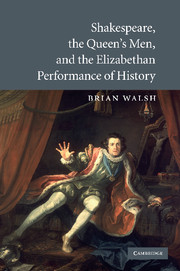Book contents
- Frontmatter
- Contents
- Acknowledgments
- Introduction
- 1 Dialogues with the dead: history, performance, and Elizabethan theater
- 2 Theatrical time and historical time: the temporality of the past in The Famous Victories of Henry V
- 3 Figuring history: Truth, Poetry, and Report in The True Tragedy of Richard III
- 4 “Unkind division”: the double absence of performing history in I Henry VI
- 5 Richard III and Theatrum Historiae
- 6 Henry V and the extra-theatrical historical imagination
- Conclusion: traces of Henry/traces of history
- Bibliography
- Index
6 - Henry V and the extra-theatrical historical imagination
Published online by Cambridge University Press: 19 January 2010
- Frontmatter
- Contents
- Acknowledgments
- Introduction
- 1 Dialogues with the dead: history, performance, and Elizabethan theater
- 2 Theatrical time and historical time: the temporality of the past in The Famous Victories of Henry V
- 3 Figuring history: Truth, Poetry, and Report in The True Tragedy of Richard III
- 4 “Unkind division”: the double absence of performing history in I Henry VI
- 5 Richard III and Theatrum Historiae
- 6 Henry V and the extra-theatrical historical imagination
- Conclusion: traces of Henry/traces of history
- Bibliography
- Index
Summary
In the opening scenes of Henry V, the Archbishop of Canterbury and the Bishop of Ely have an extended conversation about the maturation of their sovereign from a madcap Prince to a king “full of grace and fair regard” (I.i.22). This story of Hal as wild youth who is shocked into maturity by his father's death was available to playgoers in The Famous Victories of Henry V as well as in Shakespeare's Henry IV plays. As the churchmen propose various explanations for King Henry's turn – ranging from the miraculous intervention of God to Hal's own shrewd management of his persona – playgoers can think along with them, choose one version or another, or even think up a different version altogether based on their own experience of the story. The backward gaze in Richard III that I discussed in the last chapter, a kind of intertheatricality whereby characters in that play repeatedly refer back to events of 3 Henry VI, features prominently in Shakespeare's second tetralogy as well. Henry IV, Part 1 looks back on Richard II, 2 Henry IV looks back on both, and Henry V looks back on all those plays. Because of its Chorus figure, who is not subject to the fiction of belonging to the past world that Henry V depicts, this play can even end with a reference to the Henry VI series. Those plays precede Henry V in Shakespeare's career but follow it in historical chronology. Henry V thus closes with the most temporally complex vision of history – and the history play – in the Shakespeare canon. It looks back on the history that is still to come from its own putative perspective.
- Type
- Chapter
- Information
- Publisher: Cambridge University PressPrint publication year: 2009



